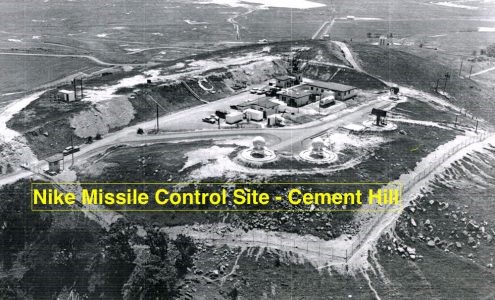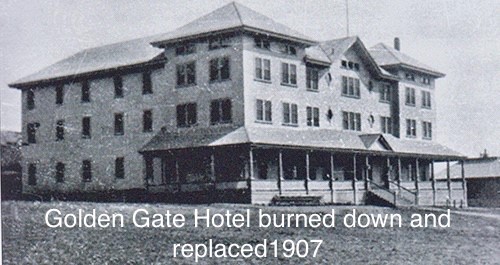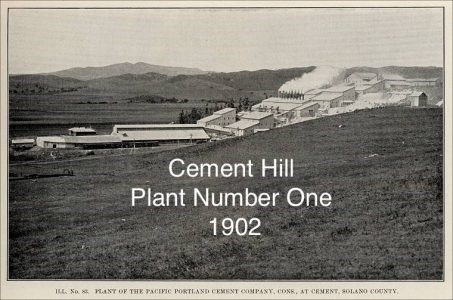Article by Bill Fernow
Cement Hill has an intriguing history that is slowly disappearing from our collective memories. Nature, crumbling foundations, and encroaching residential areas are gradually removing the last vestiges of a once thriving industry and town.
In 1896, rancher A. A. Dickey had a small operation on a portion of his ranch where he was mining limestone. In 1900, the Eureka Portland Cement Company purchased the land from Mr. Dickey. The property was attractive because it had both limestone and clay deposits, which are key ingredients for the manufacture of cement. The prospect attracted the attention of the Pacific Portland Cement Company (PPCC), which purchased 140 acres in 1901. In 1902, PPCC continued purchasing adjacent property, eventually accumulating 900 acres. The company went on to invest $500,000 in constructing the facility.
In 1902, PPCC constructed a facility for producing cement on what we now know as Cement Hill. As demand increased, the company built a second plant in 1907, incorporating several improvements. The combined output of the two plants was 6,500 barrels of cement per day. The product was transported by the Cement, Tolenas, and Tidewater Railroad to Suisun, where it was shipped out by barge. The increased production soon depleted the limestone on the hill and the company opened another quarry in El Dorado County and shipped the newly mined material by rail to Cement.
The company town of Cement was constructed with facilities to support an eventual workforce of 500 workers and a total of about 1,000 residents. It was the first town in Solano County with underground utilities, a sewer system, electricity, and running water. Fifty cottages were erected for the workers and their families. Rent was $12/month, and there was no charge for electricity or telephone usage. The town had a hotel (The Golden Gate Hotel), post office, hospital, schoolhouse, fire station, a boarding house for single men, bunkhouses, a livery stable, general store, ice house, meat market, laboratory, and a telephone exchange. Water was supplied by a pumping system from wells in Vacaville. Cement had its own electric plant, providing power for the town, the mile and a half of electric railway, and 12 kilns at the processing plant. The town farm raised cattle, sheep, pigs, and chickens for consumption by residents. The popular annual Cement Ball at the Golden Gate Hotel was one of the most important social events in the area. The hotel had accommodations for 175 guests. Facilities included tennis courts, a barbershop, pool tables, a dining room, landscaped grounds, and a swimming pool.
Suddenly in 1927, the plant was shut down, and usable equipment was shipped out to other plants operated by PPCC. The houses were auctioned off and moved to Vacaville and Fairfield. Those structures not sold were demolished.



